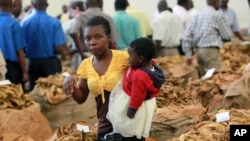Zimbabwe’s eastern Manicaland Province may have taken the hardest blows from President Robert Mugabe’s 11 years of seizures of land from white farmers. .
In eastern Zimbabwe, years of neglect have left many plantations that once produced avocados, macademia nuts, coffee and timber in a pitiful state.
These crops take up to 12 years from planting to harvest, and nearly all of farmers who ran these plantations have been evicted since land invasions began in 2000. Very few short-term crops do well in the hillier parts of Manicaland where most of Zimbabwe’s plantations used to thrive.
Replanting long-term plantations is too difficult to finance, says Trevor Gifford, immediate past president of the Commercial Farmers Union. Gifford's plantation was forcibly taken from him a year ago. “Manicaland, has fragile steep soils, it [is] primarily suited to plantations, and regrettably over the last 11 years the critical mass of plantations have been decimated through abuse, and it would be very difficult to get Manicaland back to where it was. There is no confidence to invest in long-term development,” he explained.
Zimbabwe was once a major coffee producer, but production has slumped by more than 90 percent and there are now only five remaining commercial producers who existed before the land seizures.
There are many black small-scale coffee growers who say they want to expand, and who could take advantage of assistance from the European Union, which has long assisted the coffee industry in Zimbabwe. But small growers cannot take advantage of the current record-high coffee prices because the crop they produce is too small for export without the additional production of the larger growers.
“The small-scale coffee farmer who has been growing since 1984 ... he or she knows that without the critical mass from commercial producers they are nothing because they will never produce an 18-ton container of same-style coffee,” Gifford noted.
Gifford says the agriculture ministry, controlled by Mugabe's ZANU-PF party, discourages him and the European Union from encouraging new small-scale farmers to begin growing coffee, because it would mean recognition that large-scale commercial growers, who were mainly white, were essential to the small grower.
Gifford, one of the younger evicted farmers, is penniless now, but might have had an income of more than $2-million a year if he was still on his farm. He says Manicaland’s plantations are not being rebuilt, and are still being destroyed. “I have seen in my travels; citrus industry, zero rebuilding, just destruction; macademia zero rebuilding. If you go and talk to the big timber guys, the losses that they have incurred from fires in the last four or five years ... we will be importing timber into Zimbabwe in the near future,’ he said.
Zimbabwe’s commercial plantation farmers had world class reputations for capital intensive, eco-friendly farming. Gifford says he wants to remain in his country, and adds that he and several of his colleagues would like to help rebuild the plantations.
“We have such human capital ... Africa, could if they just embraced us we could turn around government estates to get that critical mass of food. I do not want to own another bit of Africa, I do not want to put good money after bad, [but] I have skills and expertise,” said Gifford.
Gifford’s former farm, Wolverhampton, looks a mess from the road. The coffee and avocado pear trees have been chopped down. The timber is being harvested by the people who took over his farm.
Five minutes after he drove past the farm to show it to VOA, his mobile telephone rang and a man threatened him with death if he came near the property again.
Ten days later, Gifford says he was driving past the farm with friends and shots were fired at his vehicle. These incidents were reported to the police.
In small and scruffy Chipinge town, tons of macademia nuts were being sorted in a warehouse. Some of the nuts were being sold by people now living on Gifford’s farm for about $2 a kilogram.
One of the company directors, Jasset Faizel, said he and his Australian partner, Peter Fusarelli, had permission from the agriculture ministry to sell the nuts harvested from farms taken from white farmers around Chipinge.
There was no one available at the agriculture ministry to speak to the media.
Eastern Zimbabwe Plantations Face Grim Future











